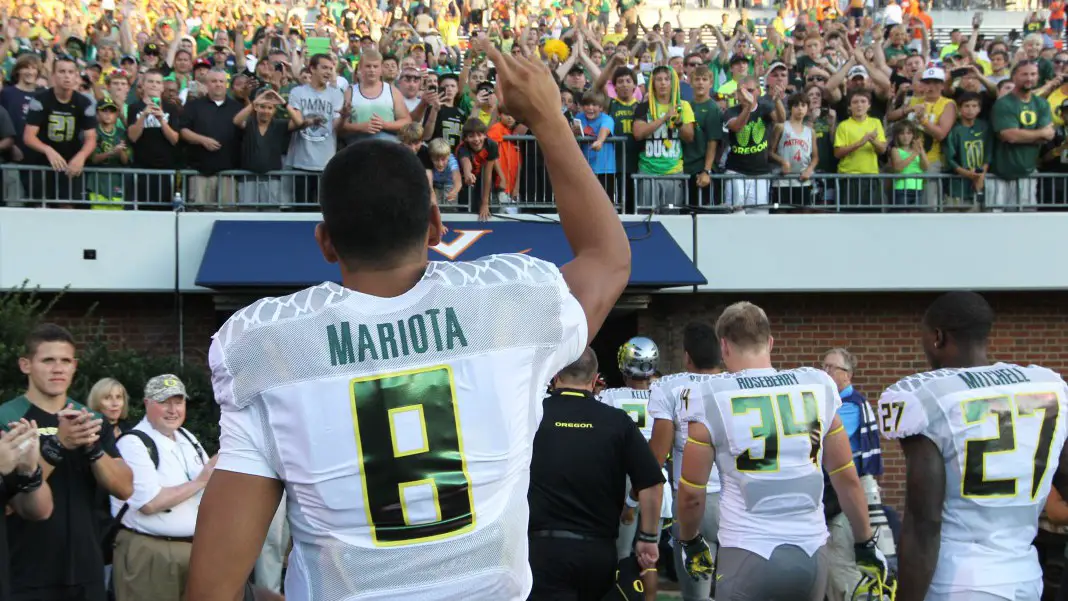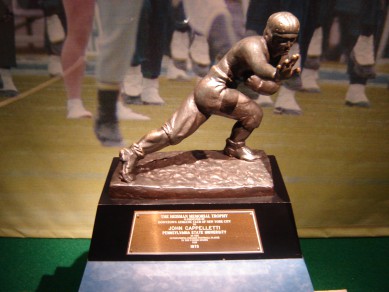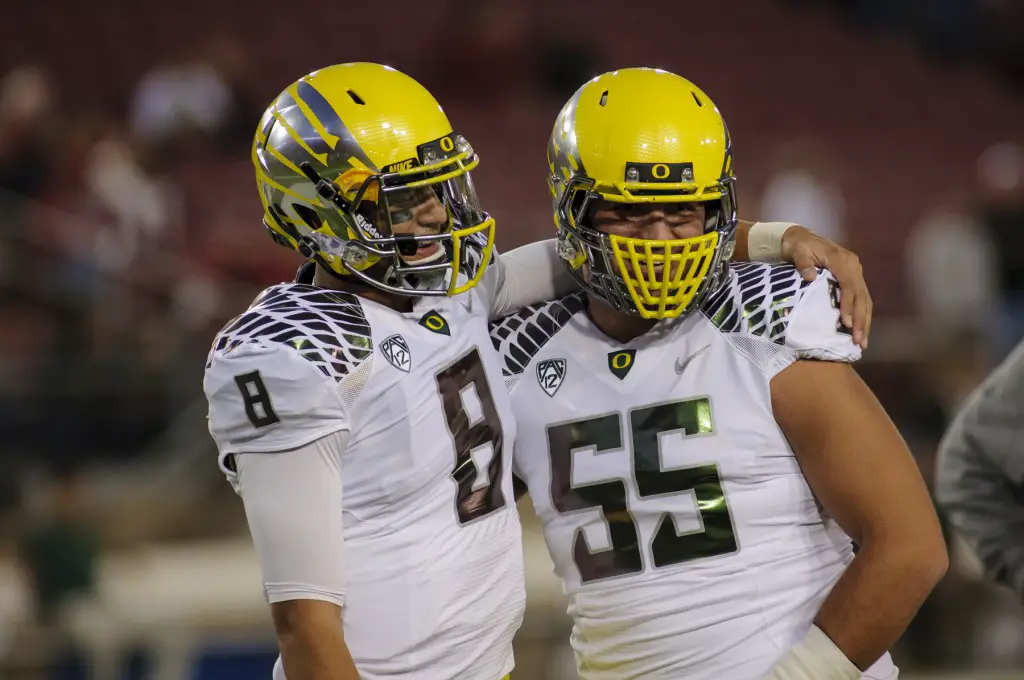As spring practices commence for the Ducks — and Marcus Mariota remains starting quarterback — high hopes for the upcoming season are infectious. Currently ranked third in the “Sports Illustrated’s” “Way-Too-Early Top 25″ and sixth on ”Bleacher Report,” 2014 is looking to be an exciting season. And with Mariota’s knee having months to heal, the stage is set for a potentially great year for the redshirt junior. With the impending season, no doubt the dual-threat quarterback will be an early-season favorite for the award. As of today, BR has Mariota ranked second behind the reigning Heisman ”champion” Jameis Winston.
Last year Oregon fans were personally affronted by Mariota’s snub for the Heisman Trophy. On further inspection of the prestigious award’s recent history, this under-appreciation may not be as large of a rebuff fans believe it to be.
The long-standing tradition of imbuing college football’s most outstanding player has spanned 79 years. First created by the Downtown Athletics Club in 1935, the DAC Trophy was awarded to Jay Berwanger. The next year, after John Heisman’s death, the DAC Trophy was switched to its current title. The all-encompassing Heisman Trophy is bestowed upon the most outstanding player “whose performance best exhibits the pursuit of excellence with integrity.” (Italics added for emphasis)
Possibly because of a renewed national dream to become an NFL quarterback, or maybe we are living in a decade of quarterback integrity, but as of late, quarterbacks have dominated the recipient list.
In fact, only one running back — Alabama’s Mark Ingram — has been awarded the title of Heisman winner since the turn of the century. (As a side note, running back Reggie Bush was the Heisman winner of 2005 but has since forfeited his trophy over legal issues.)
Of the 11 recipients who have experienced the NFL draft, only four are currently active: Carson Palmer (2002), Arizona Cardinals; Mark Ingram Jr. (2009), New Orleans Saints; Cam Newton (2010), Carolina Panthers; and Robert Griffin III (2011), Washington Redskins. And of those four, injury and general competence have been reoccurring issues hampering their production. Since 2000, no recognized recipient has seen a Super Bowl much less won one.
The careers of the past decade of Heisman recipients put some perspective on the decision to pass over our beloved Marcus Mariota. Some of the greatest players in NFL history have been snubbed by the Heisman Trust: by losing to whomever was the most popular that year or not being recognized at all. The Manning brothers are the most notable examples. In three years, the closest to the title Peyton Manning — arguably the greatest quarterback of all-time — ever reached was second in 1997. Peyton has played in three Super Bowl, winning MVP in his 2009 appearance. The younger Manning finished third in the Heisman run to Jason White (who went undrafted, one of three Heisman winners to do so). Eli is presently a two-time Super Bowl MVP.
Other greats that were runners-up include: Drew Brees (1999, 2000), Super Bowl MVP; Michael Vick (1999, 2000), four-time Pro-Bowl player; Ben Rothlisberger (2003), two-time Super Bowl winner; Colin Kaepernick (2010), led the 49er’s to their first Super Bowl since 1994; Andrew Luck (2010, 2011); and Russell Wilson (2011), led the Seahawks to a Super Bowl win this year. Joe Flacco led the Ravens to a Super Bowl win in 2012 and Richard Sherman was a vital attribute for this year’s Super Bowl champions. Neither were Heisman finalists.
The Heisman Trust Trophy is a prestigious and well-intended award; that is not being disputed. Unfortunately, as of late, there appears to be some sort of unintended side effect in being college’s most outstanding player. Sometimes a player’s skill sets simply do not transfer into their NFL careers. Subsequently not every player who was glorified with every award possible truly deserves all the hype, and that becomes visible when they’re drafted and encounter dismal, short-lived careers. And then some fantastic players never find themselves finalists for any distinguishable collegiate award because they don’t need them to find success and reinforce everyone’s mind they are great at what they do.
Marcus Mariota is a dual-threat quarterback who puts the needs of the team before his own. He gave up a chance to be a top pick in last year’s draft – and sign a lucrative contract to help his family – to honor his commitment to his team and bring them a BCS Championship. Of course, this is simultaneously occurring as he earns his college degree.
Mariota is the definition of what the Heisman stands for, yet he was overlooked for playing through injury (and resultant drop in production), for his team.
If this guy isn’t the embodiment of integrity, then who is? Moreover, looking back on the most recent recipients, it appears the award is rather lackluster in that particular department. The Heisman Trust needs to take a step back and resurrect the true Heisman legacy.
In short — Mariota doesn’t need a Heisman Trophy – the Heisman Trophy needs him.
Top photo by Andrew Shurtleff
Related Articles:
Chip Kelly Update: Everything's Good Again ...
Chip Kelly Update: Wailing and Gnashing of Teeth
Shock and Awe -- The Oregon Ducks' Football Hangover Effect
Despite Lopsided Score, Georgia State "Never Stopped Believing"
Hope Springs Eternal for Ducks
Incompetent Pac-12 Officials: How Do You Miss ALL of THIS?
Laura is a sophomore cinema studies major at the University of Oregon enrolled in the Honors College. She spent four years competing on her high school’s varsity dance team, consistently ranked top three in the state. Laura is also the senior prose editor for Ephemera Arts Journal. Sports-wise: the product of two avid sports fans from Jersey, Laura grew up attending Yankee games and cheering for the Giants. Now she devotes her team spirit to all things Oregon. You can follow her on Facebook or Instagram (@ladylaura11) because she isn’t a fan of limiting herself to 140 characters.



